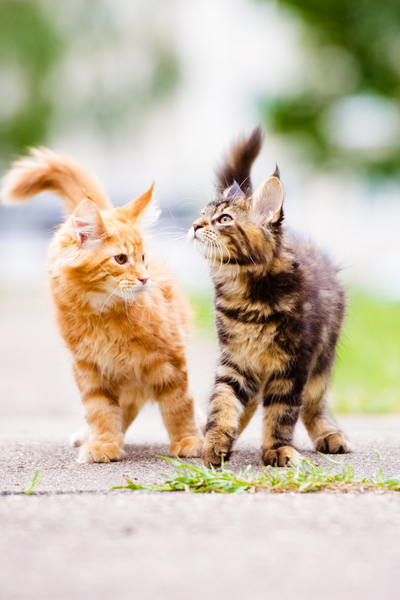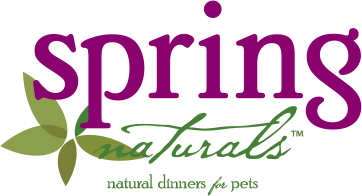
Nutritional Needs of Kittens
In their first year of life, their skeletons develop rapidly along with muscles, skin, teeth, internal organs, and fur. The first months of your kitten’s life are critical, and proper nutrition is key for it to grow properly. A diet that lacks the necessary nutrients for the development of your kitten will likely lead to vitamin and mineral deficiencies and poor growth.
The nutritional needs of kittens differ from those of an adult cat, so let’s explore the specifics about essential nutrients for kittens.
What Are Essential Nutrients?
The substances obtained from food and then used as an energy source are called essential nutrients. They are part of the metabolic mechanism required for the proper care and growth of your pet.
High-quality food should include essential nutrients that your kitten needs, unless your kitten has special needs, deficiencies, or certain diseases.
Do All Kittens Have the Same Nutritional Needs?
In kittens, the nutritional needs are about the same, with some exceptions: they suffer from an illness or have certain needs that require a special diet (e.g. large breeds).
In the first four weeks of life and until the time they are weaned, kittens feed only on breast milk (or a milk replacement), which has all the nutrients needed for them to grow harmoniously.
After 4 weeks old, their nutritional needs change. The mother cat starts to decrease its milk production, and kittens no longer tolerate lactose well.
Kittens are entirely weaned around the age of 8 weeks. After this age, they will eat soft food for a while. This new diet should be introduced gradually and be balanced and complete to meet their nutritional needs, providing enough energy and highly digestible nutrients.
*Kittens can be introduced to soft food starting from 4 weeks of age. The diet should consist of a kitten formula that will be mixed with wet or dry food until the consistency of mush.
*Avoid cow's milk or any other source of milk because it does not contain the necessary nutrients and can cause gastrointestinal disorders in the kitten (most cats become lactose intolerant). You can give them canned/wet food or soak their kitten kibbles in water or chicken broth (with no salt).
Do Kittens Have Special Nutritional Requirements?
Cats, in general, are obligatory or true carnivores, which means that they require a diet based on animal protein. Without a diet based on animal protein, cats cannot be healthy or survive.
However, a meat-only diet will be low in certain essential nutrients, such as calcium (found in bones), and calcium is particularly important in the growing stages.
Cats lack the enzymes needed to digest plant nutrients, which means they can't eat plants to meet their nutritional needs.
* Do not feed dog food to cats - it is lower in protein and high in carbohydrates!
Kitten Nutritional Needs Versus Adult Cat Needs
Kittens double or triple their weight in the first weeks of life. That is why kittens need more calories than adult cats. Quality diets formulated for kittens contain more calories to meet their nutritional needs.
Unlike adult cats, kittens will need extra vitamins, minerals, and essential amino acids, which can be taken from food or supplements. They also require a higher protein intake than an adult cat.
Regarding the number of meals per day, kittens will generally have food at their discretion, being able to eat up to 10 meals a day (wild cats hunt an average of 10-12 times in a day). Overfeeding them in this stage of their life is difficult since they grow so rapidly and consume a lot of energy.
After the growth period, food will be divided into 3-5 meals per day depending on the caloric needs for that specific weight (your cat's weight). If you want your cat to gain weight, you will take the next higher value (grams of food/cat weight) from the label of the cat food manufacturer.
The same thing will happen when you want your cat to lose weight - you will take the next lower value (which represents the weight you want your cat to reach).
How Long Should I Feed My Cat Kitten Food?
Generally, a cat is considered a kitten until the age of one year. Until this age, cats should eat food specially formulated for kittens.
Large breed cats, such as Maine Coon, Norwegian Forest Cat, Persian, Chausie, Siberian, Savannah, and others, should be fed kitten food until the age of 1.6 to 2 years. Because they have larger bodies, big cats need more vitamins and minerals to reach their final size (healthy size).
Furthermore, each cat is unique, and its nutritional needs may differ. That is why it is a good idea to talk to your veterinarian about the best diet for your little feline.
Essential Nutrients for Healthy Growth
Essential nutrients are divided into: animal protein, fat, carbohydrates, vitamins, minerals, and water.
1. Animal protein – being mandatory carnivores, animal protein should not be missing from the diet of any cat. Our fluffs get all the essential amino acids from this animal protein, which is considered the base element of the tissues (organs, joints, tendons, hair, skin, muscles, and blood).
The main protein found in a complete and balanced diet comes from chicken, turkey, beef, fish, or eggs but can also be obtained from pork, lamb, or game.
If you decide to feed your cat home-cooked meals, keep the following in mind:
- Raw meat or liver may contain parasites and bacteria that are harmful to your cat's health. It can harm you too! For example, if the meat you gave your cat is contaminated with Salmonella spp., and you didn't rigorously wash the cutting board and utensils beforehand, you can contaminate your food with this bacterium (cross-contamination), making you and your family sick.
- Eggs can also be contaminated with Salmonella spp.
- Raw fish can lead to vitamin B deficiency, causing loss of appetite, seizures, and even the death of your pet.
- Milk can cause gastrointestinal disorders such as bloating or diarrhea.
- Foods such as onions, garlic, chocolate, coffee, tea, raisins, or grapes are toxic to your cat.
2. Fats – represent the main source of energy for cats and are essential in the diet of your little feline because they help the body absorb vitamins that dissolve in fat (fat-soluble), such as A, D, E, and K.
Meat and fish contain "good fats" and Omega 3 and 6 fatty acids, all of them being essential for your cat's health. In addition to providing energy, fats also help maintain a healthy coat and skin and develop a healthy brain and vision.
3. Carbohydrates – in cats, carbohydrates play an important role in their body but are not as essential as other nutrients. They provide cats with an easy-to-digest energy source. The amount of carbohydrates that cats need in their diet is 10-15% and even less.
4. Vitamins - should be included in your cat's diet, but keep in mind that you need to feed them in optimal proportions because otherwise, your pet may develop hypervitaminosis (too many vitamins in their system).
The essential vitamins you want in your cat's food are A, D, E, and B complex.
- Vitamin A helps maintain a strong immune system and healthy eyesight. It is found in fatty tissues and the liver; too much vitamin A in your cat's diet can become toxic, so use with caution.
- The B complex contains vitamins B1, 2, 3, 6, and 12.
- Vitamins B1 (thiamine) and B12 (cobalamin) help maintain a healthy nervous system.
- Vitamin B2 (riboflavin) is needed for healthy growth and contributes to the quality of your cat's skin and fur. The lack of B2 can lead to skin modifications (especially around the eyes and on the abdomen).
- Vitamin B3 (niacin) helps the nervous system and digestive system to function properly and helps maintain healthy skin.
- Vitamin B6 (pyridoxine) is important for the immune function and red blood cells.
- Vitamin E helps maintain a shiny coat, a healthy immune system and supports vision, muscle function, cardiovascular health, etc.
- Vitamin D is essential for fixing calcium in the bones and retaining phosphorus in the cat's body. It also helps the proper functioning of bones, muscles, the nervous system, and the immune system.
5. Minerals - the essential ones are iron, calcium, magnesium, potassium, sodium, and chloride.
All of them lead to a good development of the skeleton and body and help maintain long-term health.
6. Water - it is well-known that cats are not very fond of drinking water, so it is recommended for them to have fresh water at their discretion and be fed as much as possible wet/canned food (contains about 78% water).
There are few strategies cat owners can use to encourage their cats to stay hydrated, such as an ideal shape and material of their water bowl (wide ceramic or metal bowls are the best). Also, placing water dishes all over the house in the places that your cat likes to stay the most can help, and many cats are fans of the cat water fountains.
Give Your Cat The Best
The best in low glycemic and low carb cat food, Spring Naturals is certified by The Glycemic Research Institute. All of our handcrafted recipes include 90 – 95% of proteins from all-natural fish or poultry with 6 superfoods that bolster your cat’s diet full of low carb, wheat-free, whole foods.
We punch it up with added vitamins and minerals for functionally balanced, wholesome nutrition. Certified for all life-stages, support your kitten or cat’s nutritional needs with a delicious meal from Spring Naturals.
Dr. Iuliana Mihai, DVM, Masters In Small Animals And Equines Pathology
Iuliana graduated from the University of Agronomical Sciences and Veterinary Medicine in 2012, Romania. She has a Master’s degree in Small Animal and Equines Pathology and a strong affinity for Veterinary Parasitology and Laboratory. In 2013 she started her Ph.D. in epithelial cancer in dogs and cats. She volunteered at the faculty’s clinic in her 3rd year of study, and continued her career in small animal pathology and laboratory. She has one cat and eleven rats. Her interests outside of work include traveling, writing, and crafting.

Post a Comment!